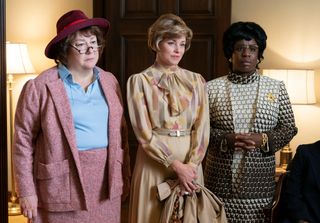
Sisters were doing it for themselves.
At least that the way it was back at the apex of Second Wave feminism, brought to you by Mrs. America , streaming now on FX on Hulu .
Battling the patriarchy is a grinding task and it is worthwhile. But as creator Dahvi Waller's show illuminates, that effort is sometimes nothing compared to what women do to each other along the way.
Mrs. America is an entertaining ride through the glory days of second-wave feminism. It's also a jagged little pill about what women gain and give up when they work in — and on — the world. The writing is sharp and the show evokes the 1970s era through the Reagan Revolution of 1980 with spot-on music, costumes and set design.

Mrs. America
The bottom line:Mrs. America tells the story of the second wave of feminism through the eyes of those who were there in the 1970s. It shows how they moved mountains in a political climate that was anything but helpful — but they also erected plenty of walls between themselves.
What's great
What's tough
All of the Mothers of the Movement are here:
- Betty Friedan, (the amazing Tracey Ullman), whose 1963 book "The Feminine Mystique" launched the second wave of American feminism.
- Gloria Steinem, (Rose Byrne), journalist and founder of Ms magazine, as the glamorous personification of the modern, liberated woman.
- Bella Abzug (Margo Martindale), the Congresswoman from New York does. "Battling Bella" believes in getting into the system and subverting it from the inside.
- Shirley Chisholm (Uzo Aduba), the first African-American woman elected to Congress and the first woman and African-American to run for the presidency.
- There's Jill Ruckelshaus (Elizabeth Banks), the pragmatic reminder that women's issues used to have bipartisan support.
- So is their nemesis, Phyllis Schlafly (the tremendous Cate Blanchett), founder of the Eagle Forum, Mother Superior of the effort that hewed the religious right to the conservative wing of the 1970s versions of the Grand Old Party.
As these women battle it out over the Equal Rights Amendment, they bring to the small screen a window into how our political world got to the place it is today.




Blanchett brings Schlafly to steely life. Her Schlafly fairly hums with ambition, and she pursues it no matter the cost, trashing women like her unmarried sister (Jeanne Tripplehorn); ordering her son, John, back into the closet and publicly embracing every fear-mongering trope about the LGBTQ community; enjoying a life as activist and author made possible by her African-American domestic help, whom she orders about with privileged obliviousness while talking at every turn about how a woman's best place is in the home, caring for her children and having dinner on the table every night at 6 p.m.
Her knowledge of international policy and her thoughts on nuclear proliferation, no one wants to hear.
The struggles of nearly a half-century ago remain very real today.
Only when a friend brings the ERA to her attention does Schlafly find a cause men will listen to her talk about. And she runs with it. She uses formidable community-organizer skills to spin up what becomes the Eagle Forum and launch the "family values" wing of the Republican Party as we now know it.
And each time she succeeds, the men in the big chairs — from Barry Goldwater to Ronald Reagan — thank her kindly and send her home to her husband and six children.
Even as Ruckelshaus warns her, "if you want to get ahead on the shoulders of men, go ahead, but just know that they are looking straight up your skirt on the way," the Schlafly Shell cannot be broken.
Mrs. America gives its cast the space to be complicated, ambitious, prickly, ruthless, warm-hearted and flawed. You know, like real women.
The feuds between Steinem and Friedan (and Friedan and Schlafly, and Friedan and the gay and lesbian community — and, well, Friedan and pretty much everyone else at some point). The political pragmatism Abzug deals in, and Chisholm's tireless belief in the principles of the movement. The tensions between straight and lesbian women in the movement. The tensions between African-American women and white women when it gets to the point where equality means some of your white privilege will be acknowledged and dealt with. The drain of being "the token" voice in the room required to explain "all black women" or "all lesbians." The discomfort some of Schlafly's "Eagles" feel when her movement goes all in with hard-core evangelical wing of the conservative movement (which includes a not-so-subtle helping of white supremacy). The way the movement leaders underestimated Schlafly.
That's all in here.
The coda unapologetically believes that the arc of history is long and bends toward justice. It also believes that bending it takes work — and work that must never end, because change is hard. And the forces that would divide us are always at work — using a playbook Phyllis Schlafly helped write.
"Does it bother you when they don't call you a 'radical' anymore?" Abzug asks, and in Martindale's face, you can see she's still working out how she's feels about it, too. Because changing the system from the inside means sometimes doing things your radical self finds uncomfortable.
"You used to feel empowered by me," Schlafly says to Alice Macray (Sarah Paulson) the fictional character who brought the ERA to Schlafly's attention, and who outgrows the narrow role of Schlafly-adoration Phyllis wants her to stay in.Because only seeing yourself in the reflection of an audience means the light dims when people leave their seats for another show. And that's uncomfortable, too.
The work these women did moved mountains — and built up walls. And it remains unfinished, which "Mrs. America" is here to remind you.
How it gets finished, well, that's the next chapter to be written.